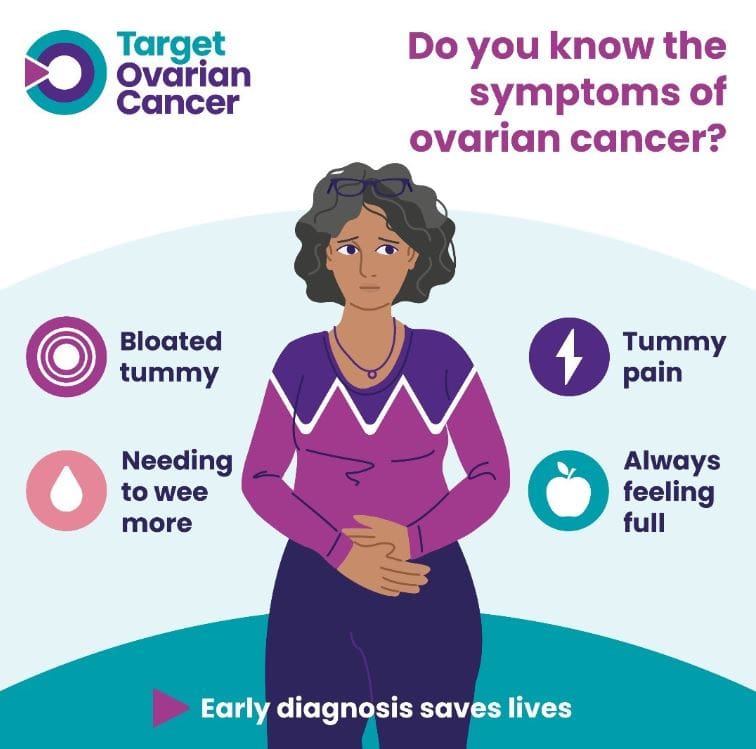March is Ovarian Cancer Awareness month. About 7,400 women are diagnosed with cancer of the ovary (ovarian cancer) each year in the UK.
Cancer of the ovary occurs when abnormal cells begin to grow and divide uncontrollably. A growth (tumour) will eventually form. Cancer cells gradually invade surrounding tissues if they are not detected early. There is a possibility that they will spread to other parts of the body.
Ovarian cancer has different types. Depending on the type of cell in which the cancer begins, you will have a particular type of ovarian cancer.
Types of Ovarian Cancer
The most common type of ovarian cancer is epithelial ovarian cancer. The treatment of primary peritoneal cancer and fallopian tube cancer is similar to epithelial ovarian cancer.
Germ cell tumours (teratomas and dysgerminomas), stromal tumours (granulosa tumours), and sarcomas are rare types of ovarian cancer.
Epithelial ovarian cancer
The most common type of ovarian cancer is epithelial ovarian cancer. Primary peritoneal cancer and fallopian tube cancer are similar to epithelial ovarian cancer and are treated in the same way.
Germ cell ovarian tumours
Ovarian germ cell tumours are rare, usually affecting women in their early 30s. Ovarian teratomas are the most common type.
Sex cord stromal tumours
There are two types of ovarian stromal tumours: benign (benign) and malignant (cancerous). The most common type of tumour is a granulosa cell tumour.
Borderline ovarian tumours
An ovarian borderline tumour is a growth of abnormal cells in the tissue covering the ovary. It is not cancer and is usually curable with surgery.
Symptoms of Ovarian Cancer
The symptoms of ovarian cancer can be very vague, particularly when the disease is in its early stages.
When to see your doctor
You should arrange to see your doctor if you have any of these signs and symptoms:
- feeling full quickly
- loss of appetite
- pain in your tummy (abdomen) or lower part of your abdomen that doesn’t go away
- bloating or an increase in the size of your abdomen
- needing to wee more often.
You may also have these other symptoms:
- tiredness that is unexplained
- weight loss that is unexplained
- changes in your bowel habit or symptoms of irritable bowel syndrome, especially if this starts after the age of 50.
These are all symptoms of other less serious conditions but if you have them or anything else that is not normal for you get them checked out by your doctor.
Symptoms will be:
- New – they’re not normal for you
- Frequent – they usually happen more than 12 times a month
- Persistent – they don’t go away.
Risks and causes of ovarian cancer
Ovarian cancer can be caused by certain factors. Any factor that increases your cancer risk is a risk factor. Cancer can be prevented by anything that lowers its risk.
Having one or more risk factors does not guarantee that you will get ovarian cancer.
- Getting older – As with most cancers, ovarian cancer becomes more common as you get older. The risk of ovarian cancer increases steeply from around 45 years. And is greatest in those aged between 75 and 79 years.
- Inherited Faulty Genes – Between 5 and 15 out of 100 ovarian cancers (5 to 15%) are caused by an inherited faulty gene. Inherited genes that increase the risk of ovarian cancer include faulty versions of BRCA1 and BRCA2. Faults in these genes also increase the risk of breast cancer.
- Previous cancer – You have an increased risk of ovarian cancer if you’ve had breast cancer in the past.
- Using Hormone Replacement Therapy (HRT) – Using HRT after the menopause increases the risk of ovarian cancer.
- Smoking – Smoking can increase the risk of certain types of ovarian cancer such as mucinous ovarian cancer. The longer you have smoked, the greater the risk.
- Asbestos – Asbestos is an insulating material that’s heat and fire resistant.
- Medical conditions – Studies have shown that women with endometriosis or diabetes have an increased risk of ovarian cancer. In diabetics, the increase in risk might be higher in those that use insulin.
- Being overweight or obese
Worried about your symptoms?
If you regularly experience any of these symptoms, which aren’t normal for you, you should contact your GP. It’s unlikely that your symptoms are caused by a serious problem but it’s important to get checked out, even if they’re mild. Your GP should order a CA125 blood test. They may also order ultrasound scans of your ovaries and tummy.
As ovarian cancer can run in families, you should tell your GP if two or more of your close relatives have had cancer.
Cysts can cause symptoms similar to ovarian cancer, but they are not associated with an increased risk. There are other conditions that have symptoms similar to ovarian cancer, such as irritable bowel syndrome (IBS).
After two weeks, consult your doctor or ask for a second opinion if your symptoms don’t improve.
